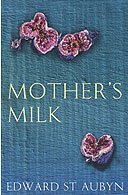 Mother's Milk by Edward St. Aubyn picks up characters from his earlier trilogy collectively titled Some Hope, something I didn't realise until after I'd finished it and began reading some of the reviews.
Mother's Milk by Edward St. Aubyn picks up characters from his earlier trilogy collectively titled Some Hope, something I didn't realise until after I'd finished it and began reading some of the reviews.Mother's Milk stands alone perfectly well, but there did seem to be too heavy a burden of backstory (all that history of the loss of family fortunes!) for such a slim volume. Ahah, now I know why.
The pleasure of the book lies in its sharp depictions of family life as seen through the eyes of the members of the Melrose family, Patrick, his wife Mary and young sons Robert over four successive August holidays.
The first three holidays are spent in Provence, in the house where Patrick, grew up. But the house is soon to be transfered to a flaky new age charity and a charlatan of a shaman called Seamus Dourke, while Patrick is effectively disinherited. His mother, Eleanor, meanwhile, is on her last legs and in a nursing home. But inheritance is about more than property - it's also about venemous anger and sense of betrayal passed on from one generation to the next, and both parents realise that they must break the chain with their own children.
I wasn't interested so much in the midlife angst of London lawyer Patrick, which has him seeking solace in the bottle and in an affair with an old girlfriend. But I had more sympathy for Mary, so absorbed into motherhood and its demands that she has nothing of herself to give anyone else.
I loved the parts of the book narrated from the viewpoint of the boys. St. Aubyn writes childhood wonderfully, and the opening pages, where the precocious and terrifying observant Robert describes his birth is for me one of the best parts of the novel. (And you can read it here.)
The writing is wonderfully witty and sharply observed. There are some wonderfully grotesque small part characters from an utterly incomptent Nanny to rich cousin Henry who turns out to have more extreme views on foreign policy than Rumsfeld and Bush.
Another joy is the many memorably acerbic one-liners. (The blurb on the back has a quote from the Sunday Telegraph describing St. Aubyn's "mocking aphoristic style", which says it nicely.) He writes, for example, about obese passengers on the flight, who had:
... the apprehensive fat of people who had decided to become their own airbag systems in a dangerous world.St. Aubyn is a writer with an intriguing past (upper class upbringing, raped by his father, became a heroin addict) which has fed into his fiction. Rachel Cooke's interview with him in the Observer is well worth a read.
You might also like to check out Michael Ardetti's fine review on the Independent website.
Would I recommend Mother's Milk? Yes. Literary fiction lovers will enjoy and appreciate it. But I think that many of the local readers of this blog would find more accessible Kiran Desai's or Hisham Matar's novels from the Booker shortlist.
4 comments:
Ooh, can I borrow Mother's Milk? I broswed through Desai's book and it left me unmoved, as did Matar's book...I have a feeling St. Aubyn writes in the style of Edmund White (a superb writer!).
The beginning of Kiran Desai's The Inheritance of Loss is slow-moving and overdetailed, perhaps a tad overwritten, but it gets better after that.
sympozium - can. i will be in town next tues evening and could bring it then.
eric - yes, i think desai's book takes it's time to really get going.(the second half of the book really shifts though) i relished the detail though and didn't want to hurry it.
Eric, will reconsider Desai's book in light of your comments.
Sharon - yes, thanks! Selamat Hari Raya!
Can't believe my stupid firm made us come in to work today. The city is dead!
Post a Comment